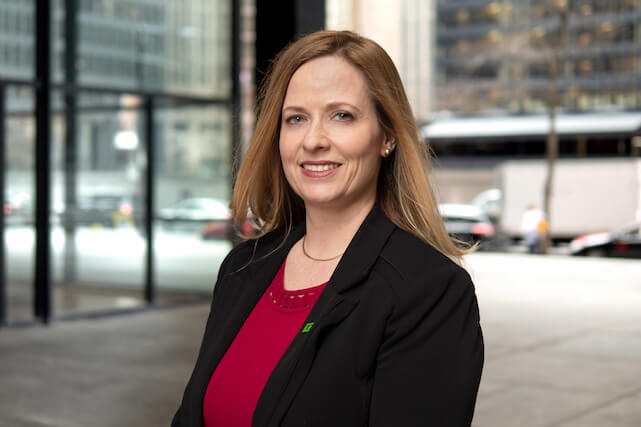Toronto’s downtown cluster of glassy TD Canada Trust towers have made up the bank’s headquarters since the late 60s—part of the era’s office building boom. The markers of the city’s bustling financial district also offer a window into the evolving nature of the bank’s relationship with the environment.
There’s no denying banks make the biggest impact on the world with how they lend and invest their money. While TD has come out with a $100 billion commitment toward sustainable finance, it has also drawn the ire of environmentalists for being named one of ten largest bank financiers of fossil fuels globally.
Although smaller in scope than its financing activities, we can’t discount the environmental impact that TD (and its 85,000 employees) has throughout its operations. Enter Michelle Albanese, on the 14th floor of the mostly open concept office. The head of responsible sourcing and supplier diversity is tasked with making sure that the financial services corporation’s supply chain is socially, ethically, and environmentally up to par. Any third-party company that services the bank needs to be cleared by her and her team.
Working with TD’s vendors—22,000 every year—to help them manage and reduce their emissions is a major focus for Albanese. TD’s global business operations became carbon neutral back in 2010. And for the past four years TD has been working with the Climate Disclosure Project—a non-profit group that encourages corporations and cities to disclose their environmental impacts. “We were the first Canadian bank to join the CDP Supply Chain Program and report our own emissions, of course, but we also encourage our key suppliers to report their own.”
Equipped with an environmental toxicology degree, she started out her career in government as a risk assessor at Environment Canada. “It’s always been important for me to contribute to protecting the environment,” says Albanese, who grew up near Oakville, Ontario’s Bronte Creek Provincial Park. Her love for nature was instilled in her as a child during the hikes she took with her family every weekend. “I grew up with a very environmentally conscious father,” she says with a smile.
While Albanese spent some time in the non-profit sector in organizations like The Nature Conservancy of Canada, most of her career has been in sustainability consulting, which gave her background knowledge in a number of sectors. After eight years in consulting, she joined TD as a procurement manager in 2013.
Sounds mundane, but making sure your office paper supplier isn’t cutting old growth forest and your computer manufacturer isn’t linked to toxic e-waste dumping in the developing world has become critical.
Procurement may be a less high-profile aspect of sustainability, but it has been gaining importance in the corporate conversation. The 2019 Sustainable Procurement Barometer—a study released by CSR performance platform EcoVadis and NYU Stern’s Center for Sustainable Business—found that, in the past three years, 81% of the 210 purchasing entities and 400 suppliers surveyed have heightened their dedication to sustainable procurement. Virtually every large corporation and government body, from municipal to federal, has responsible procurement policies in place to make sure any goods and services purchased meet environmental, social and governance standards.
Sounds mundane, but making sure your office paper supplier isn’t cutting old growth forest and your computer manufacturer isn’t linked to toxic e-waste dumping in the developing world has become critical. The public is increasingly aware of just where the companies they support get their goods.
“We had been doing green procurement through our Environmental Procurement Policy since 2009,” says Albanese, “but wanted to expand our scope to include social and ethical criteria in addition to environmental.”
As the manager of TD’s Supplier Diversity Program, Albanese makes sure there’s a more level playing field for certified minority-owned vendors who are interested in providing goods or services to TD Bank Group. In order to participate and register under this program, a supplier must be certified as a majority woman-owned and operated business or a majority LGBTQ-owned and operated one for example.
“We support Aboriginal-owned businesses through this initiative and for a company to be eligible, the supplier must be certified as 51% Aboriginal-owned and operated.”
When I ask about the obstacles she faces, Albanese says her challenge isn’t so much with large vendors. “They’re already doing what we expect of them,” she tells me. But smaller vendors aren’t necessarily educated about what’s involved in corporate social responsibility and meeting the wide cross-section of ethical procurement standards.
“It’s a conversation,” Albanese says. “Everyone can improve, but we need it to be a priority for our suppliers, just as it is for us.”







